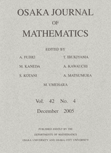
OSAKA JOURNAL OF MATHEMATICS
Scope & Guideline
Elevating Research Standards in Mathematics
Introduction
Aims and Scopes
- Differential Equations:
The journal frequently publishes studies on various types of differential equations, including stochastic and nonlinear equations, showcasing methodologies such as asymptotic analysis and variational methods. - Geometry and Topology:
Research in this area includes studies on manifold theory, toric varieties, and knot theory, often employing advanced geometric constructions and topological invariants. - Algebraic Structures:
Papers related to algebraic concepts, such as group theory, representation theory, and homological algebra, are common, highlighting innovative approaches to classification and invariants. - Mathematical Physics:
The journal features articles that bridge mathematics and physics, particularly in areas like quantum invariants and statistical mechanics, offering insights into physical applications of mathematical theories. - Stochastic Processes:
A significant emphasis is placed on stochastic processes, including their applications in modeling and analysis, as seen in papers discussing Markov processes and stochastic differential equations. - Variational Methods:
Research often includes variational problems and optimization techniques, particularly in relation to differential equations and geometric analysis, contributing to the theoretical foundation of these methodologies.
Trending and Emerging
- Stochastic Analysis and Applications:
Recent publications highlight a growing interest in stochastic analysis, particularly in the context of stochastic differential equations and their applications to various fields, including finance and physics. - Geometric Group Theory:
There is an increasing focus on the interplay between geometry and group theory, particularly in relation to algebraic topology and the study of manifolds, reflecting a trend towards more abstract mathematical constructs. - Mathematical Biology:
Emerging themes in mathematical biology suggest a rising trend in applying mathematical frameworks to biological problems, including modeling population dynamics and evolutionary processes. - Data Science and Applied Mathematics:
The integration of mathematical techniques with data science has gained momentum, with research exploring statistical methods, machine learning algorithms, and their mathematical foundations. - Higher-Dimensional Algebra:
Recent works indicate a growing interest in higher-dimensional algebraic structures, expanding the scope of traditional algebraic theories into more abstract realms.
Declining or Waning
- Classical Number Theory:
Although historically significant, recent publications have largely moved away from traditional topics in number theory, possibly favoring more applied or computational approaches to mathematics. - Elementary Geometry:
There has been a noticeable reduction in papers focusing on classical elementary geometry, suggesting a trend towards more abstract or higher-dimensional geometric studies. - Combinatorial Geometry:
Papers specifically dedicated to combinatorial aspects of geometry have become less common, indicating a possible shift in focus towards algebraic and topological methods. - Real Analysis:
While still relevant, the frequency of publications centered solely on classical real analysis techniques has decreased, with many papers integrating analysis within broader mathematical frameworks. - Discrete Mathematics:
The representation of discrete mathematics topics, such as graph theory and combinatorics, has diminished, possibly as researchers explore more complex interactions with other mathematical disciplines.
Similar Journals
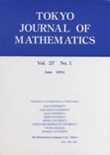
Tokyo Journal of Mathematics
Connecting Global Minds Through Mathematical ResearchTokyo Journal of Mathematics is a prestigious journal dedicated to the dissemination of high-quality research in the field of mathematics. Founded in 1978, this journal serves as a platform for researchers to publish their findings, providing cutting-edge insights into various mathematical theories and applications. Published by the TOKYO JOURNAL MATHEMATICS EDITORIAL OFFICE ACAD CENTER, the journal is based in Japan and forms an integral part of the global mathematical community. Although listed in the Q4 quartile of Mathematics (Miscellaneous) category for 2023, its inclusion in Scopus rankings highlights its ongoing commitment to scholarly excellence. The journal does not currently offer Open Access options, thus providing readers with insightful access to critical advancements in mathematics. With an ISSN of 0387-3870 and a publication history spanning over four decades, the Tokyo Journal of Mathematics remains an essential resource for researchers, professionals, and students alike, fostering the advancement of mathematical knowledge and collaboration across borders.
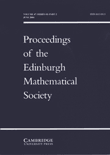
PROCEEDINGS OF THE EDINBURGH MATHEMATICAL SOCIETY
Fostering innovation in mathematical research.PROCEEDINGS OF THE EDINBURGH MATHEMATICAL SOCIETY, published by Cambridge University Press, stands as a cornerstone within the realm of mathematical research, providing a platform for original papers that push the boundaries of various mathematical disciplines. With a rich history dating back to 1883, this journal has evolved through several converged years, reflecting the dynamic nature of mathematical inquiry. As a Q2 category journal in the field of Mathematics (miscellaneous) according to the latest rankings, it situates itself within the upper tier of academic publications, offering an essential resource for researchers and professionals alike. While it currently does not offer open access options, the journal's contributions are invaluable, facilitating dialogue and collaboration among scholars. The journal's commitment to advancing mathematical knowledge makes it a vital publication for those engaged in the study and application of mathematical theories and principles.

MICHIGAN MATHEMATICAL JOURNAL
Advancing Mathematical Frontiers with Rigorous ResearchThe MICHIGAN MATHEMATICAL JOURNAL is a prestigious and influential publication in the field of mathematics, founded by the University of Michigan. With an ISSN of 0026-2285 and an E-ISSN of 1945-2365, this journal is recognized for its high-quality research and has achieved a commendable Q1 ranking in the category of Mathematics (miscellaneous) as of 2023. Published by the esteemed Michigan Mathematical Journal, it provides a platform for the dissemination of innovative mathematical theories and findings, playing a crucial role in advancing knowledge and scholarship within the mathematical community. With coverage spanning from 1996 to 2024, the journal emphasizes rigorous theoretical development and fosters collaboration among researchers, professionals, and students alike. While not an open-access journal, its contributions are invaluable for those looking to stay abreast of cutting-edge mathematical research.
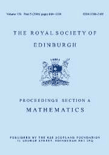
PROCEEDINGS OF THE ROYAL SOCIETY OF EDINBURGH SECTION A-MATHEMATICS
Where Innovative Theories Meet Rigorous ResearchPROCEEDINGS OF THE ROYAL SOCIETY OF EDINBURGH SECTION A-MATHEMATICS is a prestigious journal published by Cambridge University Press, focusing on high-quality research in the field of mathematics. Established in 1975, this journal has carved a niche in the academic community, evidenced by its categorization in the Q1 quartile for Mathematics (miscellaneous) in 2023 and a commendable Scopus rank of #59 out of 399 in General Mathematics, positioning it within the 85th percentile among its peers. The journal serves as a platform for disseminating innovative mathematical theories and methodologies, making it an essential resource for researchers, professionals, and students alike. Though not currently an open-access publication, it offers various access options catering to a broad audience. With a publication timeline extending through to 2024, PROCEEDINGS OF THE ROYAL SOCIETY OF EDINBURGH SECTION A-MATHEMATICS remains committed to advancing mathematical knowledge and fostering a scholarly environment conducive to scientific inquiry and collaboration.
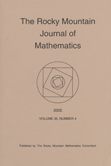
ROCKY MOUNTAIN JOURNAL OF MATHEMATICS
Pioneering Research for a Dynamic Mathematical CommunityROCKY MOUNTAIN JOURNAL OF MATHEMATICS, published by the Rocky Mountain Math Consortium, serves as a critical platform for researchers and practitioners in the field of mathematics since its inception in 1971. With a notable presence in the academic community, this journal covers a broad spectrum of mathematical disciplines, positioning itself in the Q2 category for Mathematics (miscellaneous) as of 2023. Despite being a subscription-based journal, it is recognized for its rigorous peer-review process and contributions to theoretical and applied mathematics, helping to advance knowledge and foster collaboration among mathematicians. The journal's ISSN number is 0035-7596 and its E-ISSN is 1945-3795, reflecting its commitment to accessibility and dissemination of high-quality research. Based in Tempe, Arizona, at Arizona State University, the journal continues to play an important role in shaping contemporary mathematical discourse through well-researched articles and innovative studies, aiming to bridge gaps between various mathematical subfields and engage a diverse audience, including students and established researchers alike.
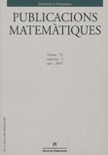
PUBLICACIONS MATEMATIQUES
Bridging Pure and Applied MathematicsPUBLICACIONS MATEMATIQUES is a prestigious academic journal published by Universitat Autònoma de Barcelona, specializing in the diverse field of mathematics and its applications. With an esteemed Q1 ranking in Mathematics (miscellaneous) for 2023, this journal holds a significant position in the mathematical community, reflecting a commitment to high-quality research that spans both theoretical and practical aspects of mathematics. Although it operates without an Open Access model, it remains accessible to a global audience, featuring contributions that range from pure mathematical theories to interdisciplinary applications. Based in Spain, its influence and reach extend internationally, making it a vital resource for researchers, professionals, and students alike who seek to stay informed and engaged with cutting-edge developments in mathematics. The journal's continuous publication since 2002 further underscores its role in advancing mathematical research and fostering scholarly dialogue.
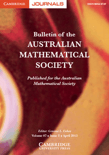
BULLETIN OF THE AUSTRALIAN MATHEMATICAL SOCIETY
Empowering the Mathematical Community Through KnowledgeBULLETIN OF THE AUSTRALIAN MATHEMATICAL SOCIETY is an esteemed journal dedicated to advancing the field of mathematics, published by Cambridge University Press. Since its inception in 1969, this periodical has fostered scholarly communication and showcased pivotal research in various domains of mathematics, now projected to continue until 2024. With an impact factor that places it in the Q2 category of miscellaneous mathematics research, it holds a notable position among its peers, ranking 215th out of 399 in the Scopus database. Though it does not currently offer open access options, the journal remains a vital resource for researchers, professionals, and students seeking to deepen their understanding of mathematical advancements. The Bulletin serves as a crucial platform for disseminating original research, comprehensive reviews, and insightful perspectives that navigate the complexities of mathematics today, ensuring the community is well-informed and engaged.

TRANSACTIONS OF THE AMERICAN MATHEMATICAL SOCIETY
Fostering Innovation in Mathematical Theory and ApplicationsTRANSACTIONS OF THE AMERICAN MATHEMATICAL SOCIETY, published by the American Mathematical Society, is a premier journal in the field of mathematics that has been contributing to the advancement of mathematical knowledge since 1900. With an ISSN of 0002-9947 and an E-ISSN of 1088-6850, this journal holds a prestigious position in the academic landscape, evidenced by its Q1 rankings in both Applied Mathematics and Miscellaneous Mathematics categories as of 2023. With a Scopus ranking of #97 in General Mathematics and a percentile standing of 75th, the journal is recognized for its rigorous peer-review process and the quality of the research it publishes. Though it does not currently offer open access options, it essentially serves as a vital resource for researchers, professionals, and students seeking critical insights and developments in mathematical theory and applications. The Transactions aim to publish high-quality research articles that foster the exchange and dissemination of ideas, supporting the growth of both theoretical and applied mathematics within the global scholarly community.

INTERNATIONAL JOURNAL OF MATHEMATICS
Advancing Mathematical Frontiers WorldwideInternational Journal of Mathematics, published by World Scientific Publishing Co Pte Ltd, is a leading academic journal dedicated to advancing research in the field of mathematics. With an ISSN of 0129-167X and an E-ISSN of 1793-6519, this journal provides a platform for the dissemination of high-quality mathematical research and fosters academic discourse among mathematicians and professionals worldwide. Operating out of Singapore, International Journal of Mathematics boasts a respectable Q2 ranking in the 2023 Mathematics (miscellaneous) category, indicating its commitment to impactful scholarship. The journal publishes articles that cover a broad spectrum of mathematical topics, ensuring valuable insights for researchers, educators, and students alike. Despite not being an open-access journal, it maintains accessibility through established university and institutional subscriptions, furthering its influence in the mathematical community. The journal has continually evolved since its inception in 1996 and will continue to be a crucial resource for insightful mathematical explorations until at least 2024.
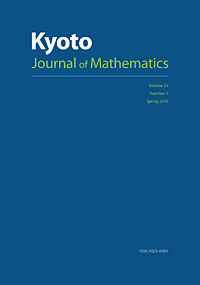
Kyoto Journal of Mathematics
Exploring the depths of mathematical discovery and excellence.Kyoto Journal of Mathematics is a premier academic publication dedicated to advancing the field of mathematics, published by DUKE UNIVERSITY PRESS. Established in 1996, this journal serves as a vital platform for sharing innovative research and breakthrough studies across various mathematical disciplines. The journal has consistently maintained a prestigious Q1 ranking in the category of Mathematics (miscellaneous) as of 2023, reflecting its significant impact and contribution to the mathematical community. With its Open Access policy, the Kyoto Journal of Mathematics ensures that groundbreaking research is easily accessible to a global audience, fostering collaboration and knowledge dissemination among researchers, professionals, and students alike. The journal's commitment to excellence and relevance in mathematical research is underscored by its extensive archive of published works and its continuous engagement with contemporary mathematical challenges. This makes the journal an essential resource for anyone seeking to stay abreast of current trends and advancements in the field.